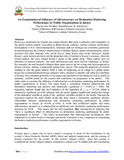An Examination of Influence of Infrastructure on Destination Marketing Performance by Public Organizations in Kenya
Abstract
Kenya as a destination for tourists has unique features that make it attractive and competitive in
the global tourism market. According to Brand Kenya, athletics, culture, tourism, horticulture,
development in ICT, telecommunication, education and our heritage can contribute generously
towards improving the country's attractiveness to holiday makers, nature conservationists, artists,
investors and other nationals who would like to make Kenya their home. However, despite
Kenya’s great tourism products and the important role of tourism to Kenya’s economy, there are
several aspects that have shaped Kenya’s image in the global arena. These aspects have an
influence on tourism industry. The road infrastructure also faces diverse challenges in Kenya.
For example, the road headed to Maasai Mara game reserve has for a long time been neglected in
diverse sections, making it impassable during rainy season. This impacted negatively on tourists
wishing to visit the game reserve. With a view of improving on its image in a global arena,
Kenya has constituted Brand Kenya initiative with a mandate to identify and refine key attributes
of Kenya, that contribute positively to the image and reputation of the Nation as well as create an
authentic, credible brand for the country that establishes our uniqueness in the global. This
study seeks to examine the influence of infrastructure on destination marketing performance by
public organizations in Kenya. The study found a correlation between infrastructure and
destination marketing was positive and statistically significant (r = 0.450, p < 0.05). The
regression analysis found that the F-statistics of the regression (F (1, 64) = 16.226) which is
statistically significant (p<0.05) indicates that the model applied significantly predict the change
of the dependent variable as result of the predictor variables include in the model. Through the
regression analysis the study further found that there exists a statistically significant positive
relationship between infrastructure and destination marketing performance in public
organizations in Kenya (β =0.439, p<0.05). A 0.439 beta coefficient implies that when
infrastructure increases or is enhanced by an additional unit, destination marketing performance
increases by 0.439. This means that the null hypothesis (Ho) wasrejected by implying that
“there is significant effect of infrastructure on destination marketing performance by public
organizations in Kenya”. The study recommended that Infrastructural development with
emphasize on comfort levels of transport and hotels of tourists is key component in stimulating
destination marketing performance in public organizations in Kenya.

